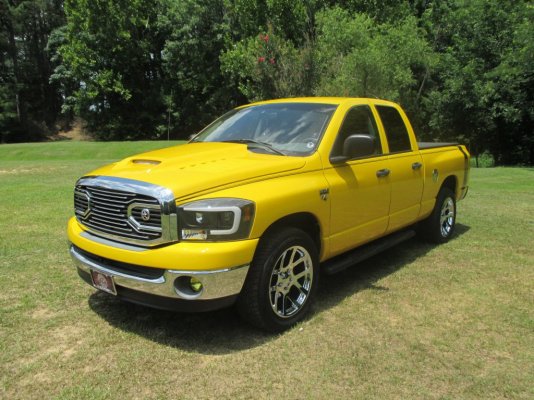Ok so my truck is posted for 15000 it's a 2000 Chevy 1500 with straight axle swap 15in lift 38x15.50x20 tires 120000miles runs like a top has dent on passenger side bed not done by me
Should I trade for this sorry copying this text
Trade for a 2012 dodge ram 2500 Cummins 4 door pre def needs about 2k in work has smog and registered clean title in hand.Needs a steering knuckle needs ball joints one brake line and needs the windshield replaced a long with one door glass and one back glass on the slider.I have a new fender for it already and tons of other parts like new hubs brakes track bar new turbo truck itself has about 210k motor was built about 60k ago and trans was done about 20k ago all new stuff. So do i
If I were to buy a gasoline powered truck I would look at Chevy or Dodge.
But which?
Not an easy call.
My gasoline powered Dodge is a 1982 B250 van with a 360 V8.
We also have a 1988 GMC G2500 with a 350 V8.
Here is the difference: the Dodge needs more frequent repairs than the GMC does, but work is a LOT easier on the Dodge as things are generally better designed.
Perfect example: oil change process: the one service that we will do the most of.
Dodge = open 710 cap (kidding) open oil cap, then the pan drain plug, drain the pain, then take out the oil filter carefully if we do not tip the oil filter we can get it out without spilling a drop.
Chevy = same thing except that there is an oil reservoir above the oil filter and we will get about a quart of oil gushing out in addition to the filter. In just about every repair that one could ever do on a Chevy there is some similar ridiculous absurd BS that we have to deal with. I have decided that Chevy were designed and engineered by sadists who hate mechanics.
But the GMC rarely needs repairs, so there is that definite trade off. So if you go Dodge, you will have to fix a lot more stupid little parts but the repairs are super-easy by contrast.
Things may be different in 2000 to 2012 series (most likely less durable).
Now diesel is a whole new ballgame. I am a senior citizen who has had more than 4 decades experience with vehicles and has learned a few things. This part should be taken very seriously. The ONLY engine that we should EVER consider should NOT be a bi-metal engine. That means iron block mated to an iron head or an aluminum block mated to an aluminum head but NEVER EVER under any circumstance do we want an iron block mated to an aluminum head. I made this mistake with my 1988 Dodge Aries K car wagon which is sitting out on the farm because the head gasket is blown.... AGAIN. It is a major pain in the #$%^& to change a head gasket every few years.
Why this happens is that aluminum heats and expands a LOT more than iron during engine use; then shrinks a lot more during cool down. The different swell rates will cause premature head gasket failure. One thing that I learned with the Aries was that the factory gasket would last 5 years tops. But with a Mopar Performance or Cometic racing gasket that I MIGHT get another 2 or 3 years SOMETIMES. But as often as not the added performance gasket discovery came late in my engine mileage and twice correlated to valve problems which had me prematurely opening the head anyways only once did I actually get 7.5 years on a Cometic. As a contrast, my 1982 Dodge B250 has had 1 head gasket change in 2004 and the 1988 GMC once in 2018. (Both the 350 and 360 are all-iron).
Well the Chevy and Ford diesels even before bi-metal were not as good as the Cummins diesel but they were worth consideration. But with both Ford AND Chevy now only making bi-metal diesel engines and only aluminum heads: so iron heads and parts for both Chevy and Ford iron heads are becoming increasingly rare and expensive. Today if you want a diesel, you want a Cummins period, full stop.
But now the question of gas vs diesel?
Both have their uses, I have both; they both get me around and haul stuff.
Bought the diesel because of cargo carrying and towing capacity vs the 3/4 ton van. Van is great for small stuff, but I cant haul my tractor or bee hives with it. Plus my upfit is pretty much a studio truck, 12' x 8' flatbed with 4' stakebed and 8' x 4' Waltco lift. The Cummins can tow and pull a lot more. IF you are planning to buy an RV or a boat that is a great justification for a diesel. But if it is just for commuting then IDK that is a real tossup.




